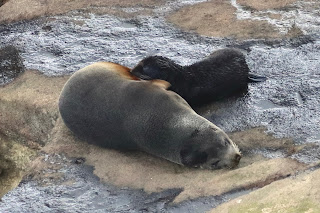The Otago Peninsula coast is incredibly windy and it’s not uncommon to have gusts up to 120 km/h (about 75 mph). The few trees found there are tipped or even bent flat by this constant and powerful wind.
New Zealand Fur Seals are abundant both here and in Australia and are easy to see all along the coast. Spring and summer is an especially fun time to watch them because the mothers have young pups with them. Male furs seals have nothing to do with raising the young and females must do it all on their own. Pups nurse for 300 days or more so this is serious work for the mum. She will spend 1-20 days at a time at sea feeding while the pup waits on shore for her to return. The length of time she is away increases as the pup grows and becomes more independent.
Nursing pup
The New Zealand Sea Lion is one of the most rare sea lion species in the world and found only here. It is highly endangered with perhaps only 10,000 animals left. There are signs of species recovery but it is happening at a very slow rate. This is because there are many more males than females. Since each female gives birth to only one pup every one to two years, birthrates overall are low. Under better circumstances a single bull sea lion will have his own harem of 20 – 25 females. On the Otago Peninsula females are very rare and some bulls actually create a harem of young male sea lions as a replacement.
Two young males playing
Mature male and smaller immature "harem" male
The darker the fur, the older the animal so this is an older but still
juvenile male with a younger male in the foreground
Another extremely rare and wonderful species we saw on the peninsula is the Yellow-eyed Penguin. The estimated population worldwide is only 4,000. There is a breeding colony of about seven pairs near Papanui Beach and we actually saw seven or eight different birds when we were there. These penguins nest in the forest above the beach. They are out at sea feeding all day and then return at dusk, hopping across the beach and then up a steep hill to their nesting grounds in the woods. The eggs and chicks are vulnerable to introduced predators such as stoats, cats, and ferrets. Just a few days before we visited Papanui Beach an egg disappeared and the nest was abandoned, a true loss to this small population of beautiful birds.
Crossing the beach
Getting ready to climb the hill to its nesting grounds











No comments:
Post a Comment